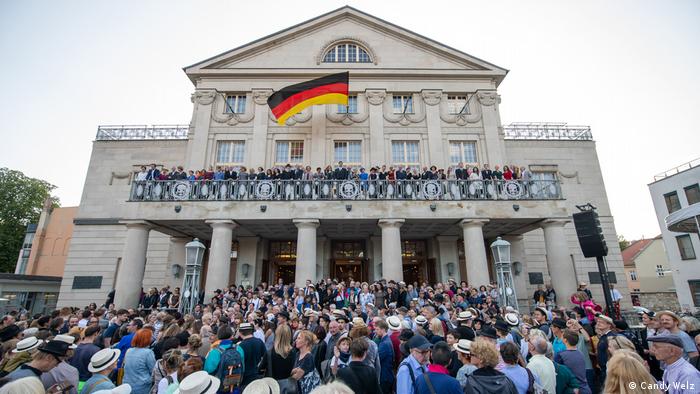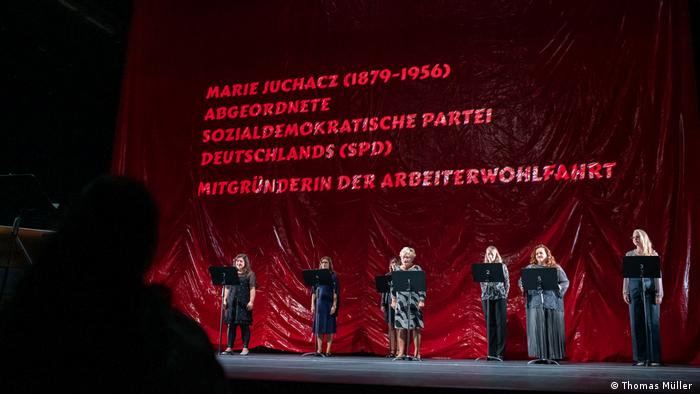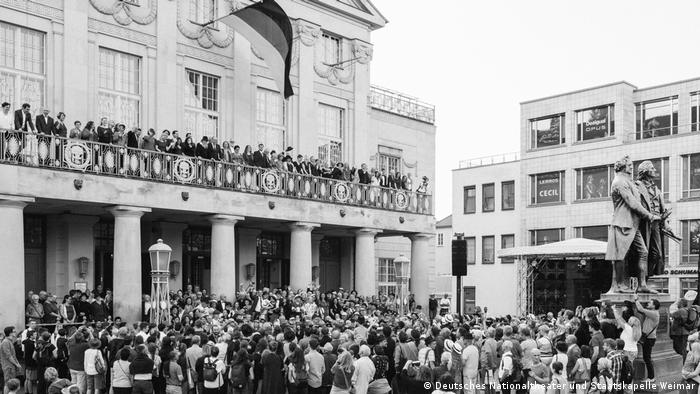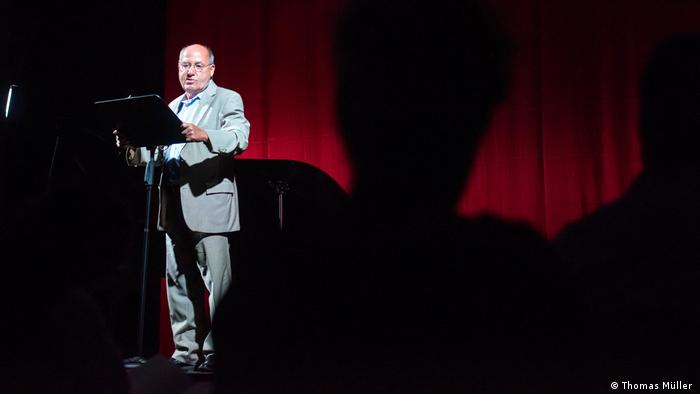“The Reichstag-re-enactment”: The Weimar arts festival celebrates a hundred years after the adoption of the first democratic Constitution in Germany. Followed by Talk about beer tax, women’s rights and the war were to blame.

The mood in the summer in Weimar, you could call it serene, almost a bit old-fashioned. Tourists besiege the street, restaurants, pedestrians enjoy the songs, the singers and musicians soon, every corner in the streets of spotless town sounded. The spirit herder’s, Goethe’s and Schiller’s, is intensely felt: calm, peace, and prosperity characterize the atmosphere. And yet, it can draw probably hardly a visitor to this serene feeling to completely surrender, without looking in the direction of the wooded etter mountain. Less than half an hour, the public buses from the centre need to Buchenwald memorial, a slightly longer walk up hills. The Weimar era-defining German classical music can never be without the unfathomable horrors of the concentration camp of thinking.

Tribute to Marie Juchacz, who campaigned for the rights of the workers
At no other place in Germany, the question arises, why within a period of 14 years from a parliamentary democracy to a System of murderous despotism was. Why was the first Constitution in January 1919, the elected national Assembly in Weimar, worked for six months, not a bulwark against the rise of Nazism?
Past revive
In a large evening, the Weimar art festival, this year’s prelude to the beginnings of democracy in Germany, perceptible to the senses. “Social sculpture” is the name of the currently at Berlin’s Maxim Gorki Theater-acting Director Nurkan Erpulat, the “Reichstag re-enactment”, which he staged for this and a second evening with Weimar’s citizens, students and politicians.
21. August, 1919, session of the national Assembly in Weimar ended, and the members gathered in the feeling to have done Great deeds, on the stairs and the balcony of the national theatre. Ten days after the constituent national Assembly, elected Reich President Friedrich Ebert on 11. August in 1919, had signed the new Constitution, resulted in historical photos.

Followed by photo with the national theatre and the Staatskapelle
In the same place, exactly 100 years later, were now invited to Weimar, one of the famous photos to recreate. And they came in droves, some even in dark skirts and with time-typical headgear. Nevertheless, the current image is expressed above all the cheerfulness of late, in liberty and democracy living descendants. The effect could be intentional.
The beginnings of democracy in Germany
The German national theatre in 1919 up to 420 members led to heated debates, summing up a hundred years later, not all of the people, the “Weimar in 1919,” wanted to experience once. What awaited her were Talking for three hours and contributions to the Debate from the national Assembly a hundred years ago. With each and every word is clear that all of the hassle and is still run today and some compromise is still controversial. The audience cheered as the words of Friedrich Ebert, with whom he on 6 apply. In February 1919 the national Assembly was opened in the presence of: “With the ancient kings and princes by the grace of God it is now gone forever. The German people is free, remains free, and governed in all future self.” An actor wore them uncommented.
The Weimar Constitution enshrined fundamental rights such as the equality of the sexes. As a social Democrat and founder of the workers ‘ welfare, Marie Juchacz was the first speech of a Deputy in the national Assembly, questioned the female role. “It will not occur to us to deny our Womanhood, because we have entered into the political Arena and for the rights of the people to fight.” Women in Weimar had to split your Text effectively among themselves.
The beer debate tax, to the war, not guilty
Amused the audience, as the technical Modern moved in the debate: “the world of transport as lust for Life” should be enshrined in the Constitution. The absurdity of the political negotiations can be revealed – shortly after a devastating defeat – the detailed discussion on a request of the then free state of Saxe-Weimar, from the beer tax community to withdraw. It remained to the victorious powers “to demonstrate German Unity”.

The politician Gregor Gysi gave a speech about the January uprising in 1919
Depressing the talk was especially when it came to the German war debt. While the victorious powers of the First world war in Versailles, the peace Treaty with high reparation payments to set-to, argument by all parties, to the far-left Communists and the Independent socialists and the German national people’s party, against a sole German war guilt. Since the evening was quite the history lesson.
The past is present
Today’s audience was thrilled when Weimar’s mayor Peter Small, the dramaturgy of the uncommented quotation broke through and the speech of Minister Franz Kreutz to the rich colors and the fundamental rights in the Constitution in the presence of prolonged: “AfD, Pegida and co. are not the keepers of the truth, but the Keeper of the hate.” This wood hammer would not have needed it at all, in order to illustrate the topicality of the dispute, who is allowed to pan the German flag in the sense of the people. The “some other history lesson”, so an audience vote, along with all the enthusiasm on the democratic at the beginning of the end of the first parliamentary democracy in the view: on The whole room distributed to students, Amateurs and actors made Speeches of the national socialists, and excerpts from the authorizing legislation of March 1933. These were not the death of democracy took the audience as a warning.